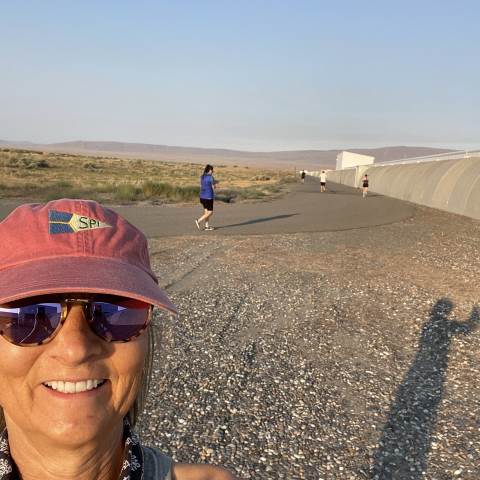

This selfie was taken before an early morning run along one of the 4-kilometer arms of the LIGO Gravitational Wave Interferometer in Hanford, Wash. It’s a physics geek’s equivalence of standing next to Taylor Swift after her concert.
This summer, I joined two dozen other physics geeks, also known as seasoned high school physics teachers, at LIGO’s International Physics and Astronomy Program for Educators. Our goal: Learn about modern physics and astronomy and practice lessons that bring these topics alive in our classrooms. Astronomy, of course, is the study of our stars and space. Modern physics refers to physics developed in the early 20th Century and includes quantum mechanics and Einstein’s theories of relativity. Here is why you are rolling your eyes and saying, “I’ll never get what she’s talking about.” It’s because these topics aren’t widely taught in high school and there is no reason why they shouldn’t be.
Let me give you an example. The gravitational wave interferometer pictured above detects changes in the gravitational fields all around us. What’s a gravitational field? Imagine you drop a pebble in a pond. If the surface of the pond represents the gravitational field, the pebble represents matter or mass that has changed that field. Now place a toy boat in the pond. It bobs up and down as it crosses the waves. The boat’s motion is changed by the shape of the field. Stated simply, “Matter tells space how to curve, and space tells matter how to move.” [1] You now have a conceptual understanding of gravitational field theory and you didn’t even touch your calculator.
My experience at the LIGO summer program was so much more than understanding modern physics. I learned that...
• Applying astronomical events to classic physics makes it fresh and exciting.
• Brilliant scientists are regular people who are exceptionally motivated by solving a puzzle, over and over and over again. (I met many!)
• Engaging lessons on modern physics are free and easy to apply (check out Perimeter Institute!)
• I’m not insane for believing my students deserve to learn about modern physics.
I can’t thank Darlington enough for this Thatcher Grant. An extra big thanks to Head of the Science Department Owen Kinney for encouraging me to apply for this highly selective program.
[1] Arthur Eddington’s observation of the bending of light around the sun.
Professional growth and development are high priorities for Darlington. Each year, faculty and staff members participate in a professional growth cycle that includes professional learning communities, professional development days, and the ability to apply for professional development grants which fund conferences, travel, workshops, instructional supplies, outside speakers, and more. For the next few weeks, our blog series will highlight some of the opportunities that faculty and staff have participated in since they were awarded 2024-2025 Thatcher Grants last spring.